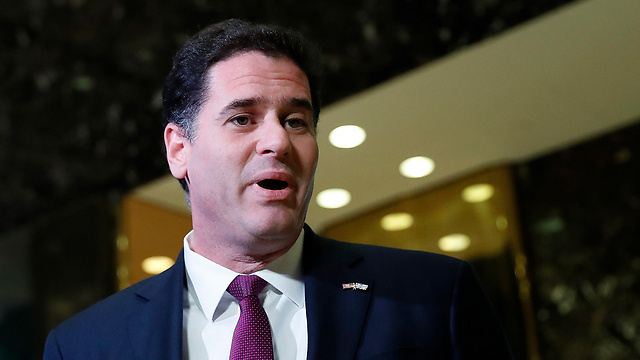

Dermer: I was aware of claims made against David Keyes
After the New York Times publishes details regarding the sexual harassment allegations made against PM Benjamin Netanyahu's foreign media spokesman, Israeli Amb. to the US Ron Dermer acknowledges he 'received a phone regarding behavior attributed to Keyes;' adds PM wasn't informed.
The Israeli envoy released his statement after the New York Times had reported that a senior journalist and former colleague of the foreign media spokesman had warned Dermer that Keyes poses a risk to women.
“The ambassador received a phone call from Bret Stephens more than six months after David Keyes assumed his post in the Prime Minister’s Office, regarding behavior attributed to Keyes before he joined the office,” according to the statement issued by Dermer's office.
“Information of the call was not conveyed to the Prime Minister's Office. If Stephens or anyone else had given the ambassador information on sexual assault or any other criminal act towards women perpetrated by anyone in the PMO — whether before or after that person was appointed — he would have notified the PMO immediately,” the statement read.
In addition, The New York Times published Thursday new details regarding the sexual harassments claims made against Keyes.
On Thursday, Keyes announced that he has decided to step down from his position in view of the multiple sexual abuse allegations being leveled against him.
"In light of the false and misleading accusations against me and in order not to distract from the important work of the prime minister, I have asked to take time off to clear my name. I am fully confident that the truth will come out,” read a statement by Keyes.
The affair began after New York state Senate candidate Julia Salazar, 27, revealed that she was sexually assaulted by the prime minister's spokesman in 2013.
In an interview with the New York Times, Salazar said that Keyes contacted her when she was a student at Columbia University and a member of "J Street U", a left-wing political lobbying group that claims to be pro-Israel—a claim disputed by many Israelis in the Right camp.
Salazar said she felt “flattered” by his interest in her. Afterwards, she claimed, they went to a coffee shop, and then to his apartment.
“In hindsight I wish I’d left, but I had no reason to think he’d do anything inappropriate or aggressive. I was kind of naïve. I was 22. I just thought, I’m an adult and I can just leave when I want to. It turned out that that wasn’t true,” Salazar elaborated.
Earlier this week, the Senate candidate claimed she resisted the prime minister's spokesman' advances. “I said no at least a dozen times. I was really not interested in any physical contact with this guy, and after I objected to stay in his apartment, he physically forced himself upon me—and only after I yielded to him did he let me leave the apartment," she claimed.
Salazar won the primaries of the US Democratic Party in the State of New York on Thursday night, defeating Democratic Senator Martin Dilan, who was running for his ninth term.
On Wednesday, Wall Street Journal reporter Shayndi Raice tweeted that she too had a “terrible encounter” with Keyes and that said she fully believes Salazar's allegations.
In a series of tweets, Raice wrote that Keyes "had absolutely no conception of the word 'no.' No matter how often I said no, he would not stop pushing himself on me." She added that she was able to get away from him "quickly and it was a very brief and uncomfortable moment but I knew as I walked away I had encountered a predator."
"I repeatedly said ‘no,’ multiple times. He repeatedly ignored me. He was basically trying to bully and pressure me into having sex with him,” Raice claimed in an interview.
According to the New York Times, Keyes’s conduct towards young women resulted in steps being taken against him. He was partially barred from writing in the Wall Street Journal’s opinion section after four employees claimed he approached them with indecent propositions.
Bret Stephens, called the spokesman a “disgrace to men” and “a disgrace as a Jew,” and barred him from the office without scheduling an appointment in advance.
Keyes apologized to some of the newspaper's employees in at least two emails for "being less than gentlemanly."
One of those employees, Kate Havard, was a Wall Street Journal intern at the time. Havard claims the prime minister's spokesman sent her late night text messages, offered her a job, and invited her to his apartment to discuss matters in detail.
When she declined his proposition, Keyes said he would have to find someone else for the job.
Another employee claimed that Keyes attacked her, pulled her to his bed, and tore off her pants after leading her into his apartment in November 2012. "He tried to take off my clothes while pulling me to bed with one arm," she said.
Between 2012 and 2014, Keyes was barred from an internship at one of his own organizations.
A former employee in one of these organizations said that the spokesman routinely made “lewd comments” about women, their bodies, and attractiveness, and frequently asked interns out on dates to the point that some of the interns decided to quit.
As a result, a female manager in the organization established a new system under which interns reported to her, not to Keyes, said a former employee.




















